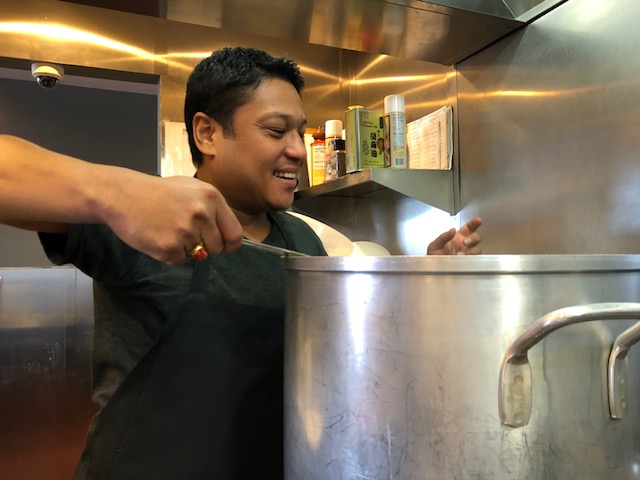There’s a new fad taking shape on the Birmingham food scene: Noodle bowls. Several new restaurants have opened recently, all serving up their own versions of this Asian comfort food. But this is not the cheap, freeze-dried stuff you lived on in college. Restaurants are serving gourmet noodle bowls including Japanese ramen and Vietnamese pho.
You can’t talk about ramen in Birmingham without mentioning Abhishek Sainju. He’s better known as Abhi, and he’s kind of the godfather of ramen in Birmingham.
“That’s just organic chicken. And we let it boil until the bone melts,” Sainju says as he stirs a giant pot of chicken broth in the kitchen at Abhi, his restaurant in the Summit. The broth recipe is a secret. All he’ll say is that it requires simmering ingredients for a minimum of ten hours. Sainju says broth is the foundation for a good noodle bowl. Originally from Nepal, he’s traveled all over Asia, and that experience inspires his cooking.
“So for example you’re getting like a Shanghai-style, Chinese-style pork belly,” he says describing the ingredients of one of his signature ramen bowls. “You’re getting the Tibetan broth, the Korean black bean chili oil which I make in the house. And you can see the flavors in there.”
To be a good chef, you have to be willing to take a few risks. Sainju says he often lies awake at night thinking of innovative ways to improve or change his ramen recipes. He’s been studying the Birmingham palate for two decades and says his main objective wasn’t just to feed people.
“Because when I wanted to open a restaurant I was like, ‘I just don’t want to throw some food out there to make money.’ I was like, ‘I want to throw some quality.’ I wanted to bring the world to Birmingham,” Sainju says.
But that wasn’t easy at first in a town that loves Southern staples like meat-and-threes and barbecue.
“I mean, Birmingham is a copycat town,” he says. “You [can get] chicken and waffle here, chicken and waffle there. I mean come on. Do something different. You know? I mean it’s not like I’m trying to outdo you.”
Sainju wanted to be the change he saw in the Birmingham food scene. So he set out to reprogram Magic City taste buds. He started by playing up familiar Southern ingredients. Traditional Japanese ramen, called tonkatsu, starts with pork broth. It’s a decadent, full-bodied base with a creamy finish. There’s also chicken, fish and vegetarian-based noodle bowl. Customer Carlie McMillan says it’s more than soup–it’s a soup entrée.
“It’s the best thing you could ever put together. It’s vegetables, it’s protein, it’s broth. It cures a cold. It’s cures the flu. It’s the best thing for you,” she says.
The medicinal effects of ramen haven’t been confirmed, but it is akin to that great American cold remedy, chicken noodle soup. The ramen craze took off in the U.S. a few years ago, but has only recently become a thing in Birmingham. Matt Chapman was enjoying a spicy noodle bowl with extra heat. He was visibly sweating as he described how he finds explaining his appreciation for ramen to his friends– the ones who think ramen comes freeze-dried, seasoned only by that little silver flavor packet. The stuff you swore you would never eat again once you became an adult.
“And I even still hear that from people. ‘Oh, you’re having ramen.’ And [this is] a whole new iteration on that and it’s good,” he says.
And he says noodle bowls like the ones served at Abhi, Shu Shopand Saigon Noodle House have been time tested and Birmingham resident-approved.

